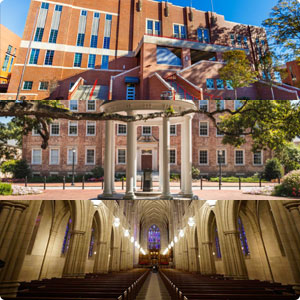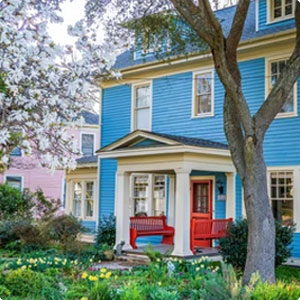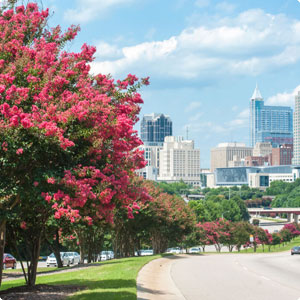Living in Raleigh
Are you moving to Raleigh, North Carolina? You are going to love living in our state’s capital. Raleigh has received numerous accolades for its outstanding quality of life. In fact, U.S. News & World Report in 2021 ranked Raleigh and Durham collectively as the #2 Best Place to Live.
Raleigh received the prestigious “Leading the Way Award” from ETC Institute in 2021 for being ranked in the top 10% of local governments in the US with regards to resident satisfaction with government services and customer service.
Plus, a poll at Men’s Health ranked Raleigh as the 3rd Happiest City in America.
In this post, we are going to share all you need to know about what it is like to live here. We’ll start out by going over some geography, and then we will discuss cost of living, employment, education, and more.

The Triangle of North Carolina
In the heart of North Carolina is the region we call “the Triangle.” Why is it called the Triangle?
The answer is the presence of three prestigious academic institutions. North Carolina State University is located in Raleigh, University of North Carolina – Chapel Hill is located in Chapel Hill, and Duke University is located in Durham. If an imaginary line were drawn from each of these locations to the next, it would form a triangle.

The Lay of the Land
Raleigh is the capital of North Carolina, and is located in Wake County. In Wake County there are several cities, townships and unincorporated communities.
There is, of course, Raleigh itself, which is mostly in Wake County, though a small part is in Durham County. There is also Durham, which is mostly in Durham County, with a small part in Wake County. Another community to know is Cary, which is located largely in Wake County, but with a small section in Chatham County.
Additional communities include Apex, Fuquay-Varina, Garner, Holly Springs, Knightdale, Morrisville (mostly in Wake County with a small part in Durham County), Rolesville, Wake Forest (mostly in Wake County with a small part in Franklin County), Wendell, and Zebulon (mostly in Wake County with a small part in Nash County).
Adjacent counties are: Granville County (to the north), Franklin County (to the northeast), Nash County (to the east), Johnston County (to the southeast), Harnett County (to the southwest), Chatham County (to the west), and Durham County (to the northwest).

What is the Cost of Living in Raleigh?
We turn to Sperling’s Best Places for data on cost of living in Raleigh. Sperling’s has an index that places the USA average cost of living at 100. Values above 100 are higher than average costs, and values below 100 are lower than average costs.
On that scale, the site gives Raleigh an overall score of 102.3. That is extremely affordable considering that you are living in the state’s capital city. For most metropolitan areas, you will have to pay steep costs to enjoy what the city has to offer. But that is not so in Raleigh.
Costs that are lower than the national average in Raleigh include utilities, transportation, health and miscellaneous expenses. Grocery costs are close to average.

What Does Housing Cost in Raleigh?
Housing is the only area with a significant increase over the US average. The median home cost in the USA is $291,700. In Raleigh, it is $346,600. Again, that is quite affordable for a vibrant city like this.

Employment Opportunities in Raleigh
According to WalletHub in 2021, Raleigh is among the best cities for starting a career. That same year, Milken Institute rated the city’s economy as the 5th highest performing nationwide.
The USA median household income in 2019 was $68,703. The Census reports that between 2015 and 2019, the median household income for Raleigh was $67,266. So, that is really close to the national average.
Some of the top employers in Raleigh include the State of North Carolina, WakeMed, North Carolina State University, Wake County Public School System, UNC Rex Healthcare, the City of Raleigh, and Wake County.

Raleigh Education
As you might have guessed based on the list of top employers above, education is a big deal in Raleigh and the Triangle.
If you have younger children, they will likely attend the aforementioned Wake County Public School System. A number of magnet schools, alternative high schools, and early college high schools are available as well. There are also a variety of charter schools and private schools. So, there are considerable options.
For higher education, students in this area may attend North Carolina State University, Wake Technical Community College, Meredith College, William Peace University, St. Augustine’s University, Skema Business School, Strayer University, ECPI College of Technology, Duke University, the University of North Carolina, and others.

Crime in Raleigh
On a scale ranking low crime at 1 and high crime at 100, Sperling’s sets the US average violent crime rate at 22.7. Violent crime in Raleigh is lower than average on that scale at 20.3.

Getting Around Raleigh
It is easy to get around Raleigh and the Triangle using the system of interstates and US Routes that traverse the area.
If you want to use public transportation, you can take the bus operated by GoRaleigh or the GoTriangle commuter bus.
The city is also a welcoming place for cyclists and pedestrians.
There is more good news in the form of low commute times. Sperling’s says that the US average one-way commute time is 26.4 minutes. But the average time to commute one direction in Raleigh is only 23.4 minutes.
According to Sperling’s, 78.5% of people in Raleigh drive to work alone, and 8.9% carpool. 7.1% work from home, and 2% use public transportation. It is likely work at home figures have increased since the pandemic.

How is the Weather in Raleigh?
Living in Raleigh, you can expect summertime highs of around 90 degrees Fahrenheit, and winter lows dropping to around 30 degrees Fahrenheit.
There are about 46 average annual inches of rain and about 4 inches of annual snow. So, four distinct seasons await you.
The site has a comfort index where the most comfortable locations score a 10. The US average is 7. Raleigh’s score is 7.5, so it is a more comfortable climate than the US average.

Leisure and Entertainment in Raleigh
Even though Raleigh is not a major tourism hotspot, it easily could be. There is so much to see and do, no matter what you are interested in.
If you are into museums, just a few to check out include the African American Cultural Complex, the Contemporary , and the North Carolina Museum of Natural Sciences.
Love sports? Some local teams to follow include the Carolina Hurricanes, North Carolina FC, North Carolina Courage, and Carolina Mudcats.
If the outdoors are more your thing, there are more than 8,100 acres of park land in Raleigh alone, and even more beyond.
You also can enjoy delicious local eateries, boutique shops, and nightlife.
Move Into Your Raleigh Dream Home
Can’t wait to call the highly rated city of Raleigh or the surrounding region your home? The Martini Mortgage Group is waiting to welcome you and help you find a suitable home loan. To begin, please call at (919) 238-4934 to schedule your consultation. We work with homebuyers and homeowners throughout North Carolina as well as the states of South Carolina, Florida, Georgia, Illinois, Tennessee and Virginia.
See What Our Clients Are Saying About Us
Quick Links
Contact
- Martini Mortgage Group
507 N Blount St
Raleigh, NC 27604 - Find us on Google
- Phone: (919) 238-4934
- NMLS# 143962
Copyright © Martini Mortgage Group | All Rights Reserved.
Terms of Use | Privacy Policy

Martini Mortgage Group at Gold Star Mortgage Financial Group, Corporation | NMLS # 3446 | For licensing information go to: www.nmlsConsumerAccess.org and/or www.GoldStarFinancial.com Please review our Disclosures & Licensing information | Gold Star Mortgage Financial Group Corporation has no affiliation with the US Department of Housing and Urban Development, the US Department of Veterans Affairs, the US Department of Agriculture or any other government agency. Equal Housing Lender. For further information about Gold Star Mortgage Financial Group, Corporation, please visit our website at www.GoldStarFinancial.com. Receipt of application does not represent an approval for financing or interest rate guarantee. Applicant subject to credit, acceptable appraisal, title, and underwriting approval. Not all applicants will be approved. Other terms and conditions apply. Contact Gold Star Mortgage Financial Group, Corporation for more information and up-to-date rates.
[contact-form-7 id="9130e6a" title="Contact Form"]
